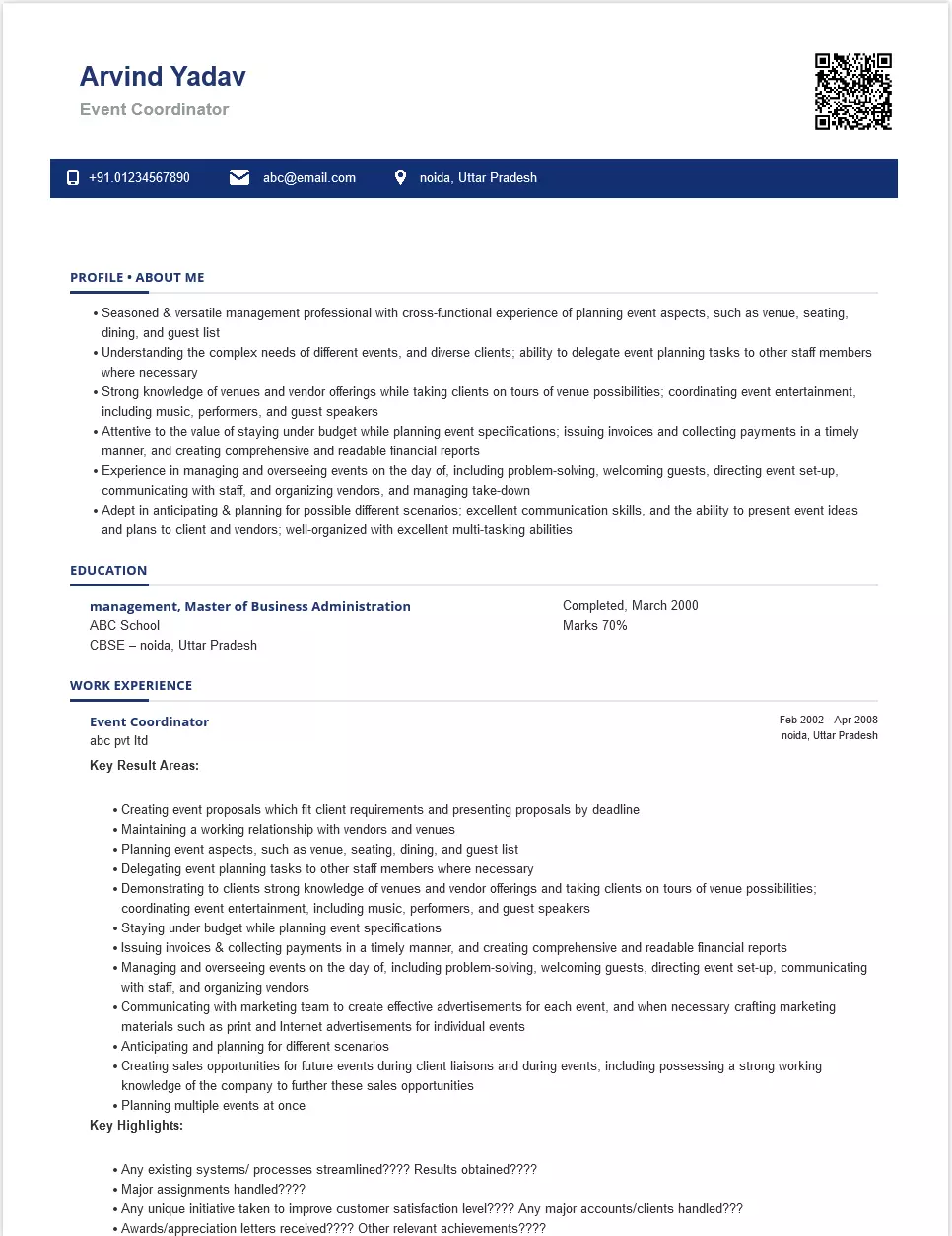- Arvind Yadav/Certifications in Event Planning, Completed , January 2015
What's your job?
Event Coordinator Resume Samples and Templates for 2026
- Table of Contents
- Downloadable Sample
- Resume Tips from Experts
- Resume Text Version
- Share
Event Coordinator Text-Only Resume Templates and Samples
Arvind Yadav
Phone: 01234567890
Email: abc@email.com
Address: sec-44, Noida, Noida
About Me
Event Coordinator
- Seasoned & versatile management Event Coordinator with cross-functional experience in planning event aspects, such as venue, seating, dining, and guest list
- Understanding the complex needs of different events, and diverse clients; ability to delegate event planning tasks to other staff members where necessary
- Strong knowledge of venues and vendor offerings while taking clients on tours of venue possibilities; coordinating event entertainment, including music, performers, and guest speakers
- Attentive to the value of staying under budget while planning event specifications; issuing invoices and collecting payments in a timely manner, and creating comprehensive and readable financial reports
- Experience in managing and overseeing events on the day of, including problem-solving, welcoming guests, directing event set-up, communicating with staff, organizing vendors, and managing take-down
- Adept in anticipating & planning for possible different scenarios; excellent communication skills, and the ability to present event ideas and plans to clients and vendors; well-organized with excellent multi-tasking abilities
Education
Science, Master of Science, Completed, March 2000
ABC School
CBSE
New delhi,
Certifications
Work Experience
Period: August 2010 - Current
Event Coordinator
GSL EVENT MANAGEMENT COMPANY
Delhi,
- Developed event proposals that fit the client’s requirements and presented proposals by the deadline.
- Planned event aspects, such as venue, seating, dining, and guest list.
- Coordinated event entertainment, including music, guest speakers, and, performers.
- Understood requirements for each event; planned events with attention to financial and time constraints.
- Booked venues and scheduled speakers.
- Researched vendors (catering, decorators, musicians, etc.) and choose the best combination of quality and cost.
- Negotiated with vendors to achieve the most favorable terms; hired personnel.
- Managed all event operations (preparing the venue, invitations, etc.).
- Performed final checks on the day of the event (e.g. tables, technology) to ensure everything meets standards.
- Evaluated the event’s success and submit reports.
Period: February 2002 - April 2008
Event Event Planner
Abc Pvt Ltd
Noida, UP
- Creating event proposals that fit client requirements and presenting proposals by the deadline
- Maintaining a working relationship with vendors and venues
- Planning event aspects, such as venue, seating, dining, and guest list
- Delegating event planning tasks to other staff members where necessary
- Demonstrating to clients strong knowledge of venues and vendor offerings and taking clients on tours of venue possibilities; coordinating event entertainment, including music, performers, and guest speakers
- Staying under budget while planning event specifications
- Issuing invoices & collecting payments in a timely manner, and creating comprehensive and readable financial reports
- Managing and overseeing events on the day of, including problem-solving, welcoming guests, directing event set-up, communicating with staff, and organizing vendors
- Communicating with the marketing team to create effective advertisements for each event, and when necessary crafting marketing materials such as print and Internet advertisements for individual events
- Anticipating and planning for different scenarios
- Creating sales opportunities for future events during client liaisons and during events, including possessing a strong working knowledge of the company to further these sales opportunities
- Planning multiple events at once
Skills
- Event Planning
- Team Management
- Time-Management
- Knowledge of Common Reservation Software
- Team-Oriented
- Written & Verbal Communication
- Client-Management Skills
- Flexibility
- Social Media Marketing
- Vendor Negotiations
- Brand Strategy Alignment
Languages
Softwares
Operating System
Personal Interests
- Community service
- Cooking or baking
- Exercising and healthcare
 India's
premier resume service
India's
premier resume service





